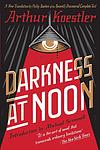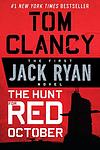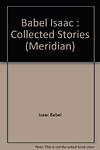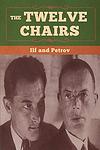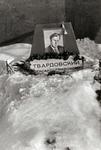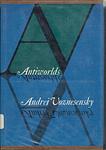The Greatest "Fiction, Soviet Union" Books of All Time
Click to learn how this list is calculated.
This list represents a comprehensive and trusted collection of the greatest books. Developed through a specialized algorithm, it brings together 300 'best of' book lists to form a definitive guide to the world's most acclaimed books. For those interested in how these books are chosen, additional details can be found on the rankings page.
Genres
The category of "Soviet Union" books encompasses literature that explores the history, politics, culture, and society of the former Soviet Union. These books may cover topics such as the rise and fall of communism, the Cold War, the Soviet economy, the lives of ordinary citizens, and the impact of Soviet policies on the world. They may also include memoirs, biographies, and fiction set in the Soviet Union or written by Soviet authors. Overall, the category of "Soviet Union" books provides a comprehensive look at one of the most significant and complex political systems of the 20th century.
Countries
Date Range
Reading Statistics
Click the button below to see how many of these books you've read!
Download
If you're interested in downloading this list as a CSV file for use in a spreadsheet application, you can easily do so by clicking the button below. Please note that to ensure a manageable file size and faster download, the CSV will include details for only the first 500 books.
Download-
1. Doctor Zhivago by Boris Pasternak
Set against the tumultuous backdrop of the Russian Revolution, the book follows the life of a physician and poet, Yuri Zhivago, as he navigates the political and social upheaval of the early 20th century. Torn between his love for two women, his wife Tonya and his passionate mistress Lara, Zhivago's personal struggles mirror the larger societal changes occurring around him. The novel explores themes of love, war, and the human spirit, offering a poignant and complex portrait of life during a time of revolutionary change.
-
2. One Day in the Life of Ivan Denisovich by Aleksandr Solzhenitsyn
This novel provides a detailed account of a single day in the life of a prisoner, Ivan Denisovich, in a Soviet labor camp in the 1950s. The narrative follows Ivan as he navigates the harsh realities of his daily routine, from the moment he wakes up to when he goes to bed. The book provides a stark portrayal of the brutality and inhumanity of the Soviet gulag system while also highlighting the resilience and dignity of the human spirit under such oppressive conditions.
-
3. Darkness at Noon by Arthur Koestler
"Darkness at Noon" is a novel set during the Stalinist purges in Russia in the 1930s. The story follows an old Bolshevik, who is imprisoned and psychologically tortured by the government he helped create. As he reflects on his life and the choices he made, he grapples with the betrayal of his revolutionary ideals and the corruption of the Soviet regime. The narrative provides a profound exploration of the moral danger inherent in a system that is willing to sacrifice the individual for the supposed collective good.
-
4. And Quiet Flows The Don by Mikhail Sholokhov
"And Quiet Flows The Don" is a sweeping epic set in the early 20th century, following the lives of several characters in the Don River region of Russia. Through the lens of the Melekhov family, the novel explores the impact of war, revolution, and societal changes on both individuals and the community as a whole. With vivid descriptions and rich character development, the book delves into themes of love, loyalty, and the struggle for survival amidst the tumultuous backdrop of historical events.
-
5. The Kite Runner by Khaled Hosseini
This novel is a powerful story set against the backdrop of tumultuous events in Afghanistan, from the fall of the monarchy through the Soviet invasion and the rise of the Taliban regime. It follows the life of a wealthy boy and his best friend, a servant's son, their shared love for kite flying, and a terrible incident that tears their lives apart. The narrative explores themes of guilt, betrayal and redemption as the protagonist, now an adult living in America, is called back to his war-torn homeland to right the wrongs of his past.
-
6. The Hunt for Red October by Tom Clancy
This novel details the story of a high-ranking Russian submarine captain who aims to defect to the United States without sparking a war between the two nations. The American government, upon receiving information about the captain's intentions, sends its best analyst to aid in the successful defection of the captain and his crew. The novel is a thrilling tale of espionage, filled with suspense and detailed technical descriptions of military technology and procedure.
-
7. Cancer Ward by Aleksandr Solzhenitsyn
"Cancer Ward" is a poignant novel set in a Soviet cancer hospital in the mid-1950s. It follows the lives and struggles of patients and doctors, exploring their personal histories, relationships, and the political environment of the time. The hospital serves as a metaphor for the oppressive Soviet state, with cancer symbolizing the malignant growth of totalitarianism. The book also explores themes of mortality, the human spirit, and the will to survive.
-
8. Red Cavalry by Isaac Babel
The book is a collection of short stories that delve into the experiences of a Jewish political commissar serving with the Cossack regiment in the Soviet Red Army during the Polish-Soviet War of 1919-1921. Through a series of vivid, often brutal vignettes, the narrative explores the harsh realities of war, the cultural tensions between the Jewish intellectual and the Cossack soldiers, and the moral ambiguities faced by individuals caught in the turmoil of conflict. The stories are renowned for their stark, powerful prose and their unflinching examination of the human condition amidst the chaos of war.
-
9. The Crucible by Arthur Miller
Set during the Salem Witch Trials in the late 17th century, this play explores the hysteria, deceit, and religious extremism that plague a small Puritan village in Massachusetts. The protagonist, a flawed but essentially good man, is caught in a web of accusations when young girls in the town start displaying strange behavior and accusing others of witchcraft. The ensuing trials reveal not only the dangers of mass hysteria and false accusations, but also the destructive power of societal pressures and the human capacity for both cruelty and heroism.
-
10. A Tomb for Boris Davidovich by Danilo Kiš
"A Tomb for Boris Davidovich" is a collection of seven short stories exploring the nature of political and personal identity, primarily in Eastern Europe during the 20th century. The stories are interconnected, each focusing on a different character who is caught up in the political turmoil of the time, often meeting tragic ends. The book is known for its exploration of totalitarianism, the nature of identity, and the power of the state over the individual.
-
11. The Collected Stories of Isaac Babel by Isaac Babel
This collection of short stories presents a rich tapestry of narratives exploring the harsh realities of war, the complexities of Jewish life in early 20th century Russia, and the human condition. Written by a renowned Russian author, the stories are known for their vivid imagery, poignant themes, and incisive social commentary. The collection includes famous works like "Red Cavalry", a series of stories based on the author's experiences as a journalist during the Russo-Polish War, and "Odessa Stories", which depicts the vibrant yet often brutal life in the city's Jewish ghetto.
-
12. First Circle by Aleksandr Solzhenitsyn
"First Circle" is a gripping narrative set in a Soviet Union labor camp during the Stalin era, where the prisoners are intellectuals and scientists. The story revolves around these individuals who, despite their grim circumstances, engage in political and philosophical debates, striving to maintain their dignity and humanity. The novel explores themes of morality, corruption, and the human spirit, providing a vivid and harrowing depiction of life under Stalinist rule.
-
13. The Twelve Chairs by Ilya Ilf, Evgeniy Petrov
In this satirical novel, a former nobleman and a con artist form an unlikely partnership in pursuit of hidden treasure. After the Russian Revolution, fortunes are overturned, and the nobleman learns that his family jewels were sewn into one of the twelve chairs from a dining room set. As the chairs have been scattered by the new Soviet regime, the duo embarks on a wild chase across the USSR, encountering a colorful cast of characters and navigating the absurdities of the communist system. Their quest for wealth is a humorous reflection on human greed and the ironies of fate in a society undergoing radical change.
-
14. The Bedbug And Selected Poetry by Vladimir Mayakovsky
"The Bedbug And Selected Poetry" is a collection of poems by Vladimir Mayakovsky, a prominent Russian poet of the early 20th century. The book features a mix of Mayakovsky's avant-garde and politically charged works, showcasing his unique style and themes of revolution, love, and the struggles of the working class. Through his powerful and dynamic verses, Mayakovsky offers readers a glimpse into the social and cultural landscape of his time, while leaving a lasting impact with his thought-provoking and emotive poetry.
-
15. The Foundation Pit by Andrey Platonov
The book is a dark and satirical portrayal of the Soviet Union's early years of communism, focusing on a group of workers involved in the construction of a gigantic pit intended to lay the foundations for a utopian future. As they dig deeper, the narrative delves into the absurdities and tragedies of the Soviet system, revealing the disconnect between the lofty ideals of the revolution and the harsh realities faced by the people. The characters, ranging from disillusioned laborers to ideologically blinded officials, grapple with the meaning of progress and human purpose in a society where language and thoughts are contorted by political dogma, ultimately questioning the human cost of a forced march towards a promised paradise.
-
16. Envy by Yury Olesha
The novel is a satirical exploration of the conflict between the old, pre-revolutionary generation and the new Soviet order. It centers on Nikolai Kavalerov, a man who finds himself homeless and disillusioned with the socialist society around him. He is taken in by Andrei Babichev, an ardent supporter of the new regime and the creator of the perfect Soviet food, the "Olympian sausage." Kavalerov becomes envious of Babichev's success and his revolutionary brother Ivan, leading to a psychological struggle that reflects the larger societal tensions of the time. The narrative delves into themes of identity, purpose, and the nature of envy, as characters grapple with their roles in a rapidly changing world.
-
17. Forever Flowing by Vasily Grossman
The book is a poignant exploration of life, freedom, and the human condition, set against the backdrop of the Soviet Union after World War II. It follows the story of a former Gulag inmate who, upon his release, grapples with the profound changes in society and his own personal struggles. Through his journey, the narrative delves into the nature of totalitarianism, the resilience of the human spirit, and the search for truth and redemption amidst the oppressive political landscape of the time. The protagonist's reflections and interactions with other characters offer a deep meditation on the cost of war, the meaning of liberty, and the enduring quest for justice.
-
18. The Yiddish Policemen's Union by Michael Chabon
In an alternate reality where Jewish refugees found sanctuary in Alaska during World War II, the book follows a homicide detective in the Yiddish-speaking metropolis of Sitka as he investigates the murder of a former chess prodigy. The detective's quest takes him from the city's seedy underbelly to the highest echelons of power, and he uncovers a vast conspiracy that threatens the very existence of the Jewish homeland in Alaska. The novel is a blend of detective fiction, alternate history, and Jewish humor.
-
19. Goat Song by Konstantin Vaginov
"Goat Song" is a satirical novel that delves into the life of a disillusioned intellectual in post-revolutionary Russia. The protagonist, a poet, grapples with the banality and absurdity of his existence in a society undergoing rapid and disorienting change. Through a series of allegorical and often surreal episodes, the narrative critiques the cultural and spiritual decay of the time, juxtaposing classical references and modernist sensibilities to explore themes of artistic integrity, societal collapse, and the search for meaning in a world that seems increasingly hostile to the individual's quest for identity and purpose.
-
20. Vasili Tyorkin by Alexander Tvardovsky
The book is a classic Soviet-era narrative poem that follows the eponymous character, an everyman soldier, through his experiences on the Eastern Front of World War II. With a blend of humor, pathos, and folk wisdom, the protagonist embodies the resilience and resourcefulness of the Soviet people during the war. Through a series of episodic adventures, the poem paints a vivid picture of life on the front lines, capturing the camaraderie among soldiers, the hardships of battle, and the indomitable spirit of the protagonist as he navigates the brutal realities of war with wit and cunning.
-
21. The Blue Book by Mikhail Zoshchenko
"The Blue Book" is a satirical collection of short stories that offer a humorous yet poignant commentary on the absurdities of life in Soviet Russia. Through a series of anecdotes and vignettes, the author captures the struggles of ordinary citizens as they navigate the complexities and contradictions of the Soviet system. With a sharp wit and a keen eye for irony, the stories delve into themes of bureaucracy, poverty, and the human condition, revealing the author's skepticism about the promises of the socialist state and the resilience of the Russian people in the face of societal challenges.
-
22. The Return and Other Stories by Andrey Platonov
"The Return and Other Stories" is a collection of short narratives revolving around the theme of human struggle and resilience in the face of oppressive political regimes and harsh living conditions. The stories, set against the backdrop of Soviet Russia, explore the complexities of human nature, the power of hope, and the resilience of the human spirit. The characters, often ordinary people, grapple with existential questions and the harsh realities of life, providing a poignant critique of the socio-political landscape of the time.
-
23. Antiworlds by Andrey Voznesensky
"Antiworlds" is a collection of poetry that provides a glimpse into the Soviet Union during the Cold War era. The poems are characterized by their avant-garde style, exploring themes of love, politics, and the human condition. The book includes the author's reflections on his travels around the world, his experiences with other cultures, and his perspective on the political climate of his time. The poems are both personal and universal, offering a unique perspective on the world during a period of intense political and social change.
-
24. The Burn: A Novel in Three Books : (late Sixties--early Seventies) by Vassily Aksyonov
"The Burn: A Novel in Three Books : (late Sixties--early Seventies)" is a historical novel that explores the cultural and political landscape of the Soviet Union during the late 1960s and early 1970s. The book follows a group of intellectuals, artists, and dissidents who are striving to preserve their individuality and freedom in a society that is increasingly oppressive and conformist. The narrative is punctuated by surreal and fantastical elements, reflecting the characters' struggle to maintain their sanity and dignity in a world that seems to be spiraling into madness.
-
25. The Zone by Sergei Dovlatov
"The Zone" is a semi-autobiographical novel that follows the life of a writer who is confined to a Soviet labor camp. Through a series of vignettes, the protagonist reflects on his experiences in the camp, the absurdities of the Soviet system, and the struggles of maintaining his identity and integrity in the face of oppression. With dark humor and sharp observations, the book offers a poignant and satirical portrayal of life in the Soviet Union.
Reading Statistics
Click the button below to see how many of these books you've read!
Download
If you're interested in downloading this list as a CSV file for use in a spreadsheet application, you can easily do so by clicking the button below. Please note that to ensure a manageable file size and faster download, the CSV will include details for only the first 500 books.
Download

